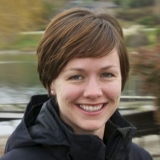EAS Welcomes New Board Members
The Evolutionary Anthropology Society (EAS) has held its annual elections, welcomes new members and thanks candidates who stood for office. The Board now includes: Frank Marlowe, President (2012-14); John Patton, Past President (2012-14); Raymond Hames, President-Elect (2012-14); Dawn Neill, Secretary/Treasurer (2012-16); Siobhán Mattison, Contributing Editor (2012-16); Bria Dunham, Webmaster (2012-16); Carol Ember, Member-at-Large (2010-14); Mary Shenk, Member-at-Large (2012-16); Brooke Scelza, Member-at-Large (2012-16); Shane MacFarlan, Member-at-Large (2012-14); and Katie Starkweather, Student Representative (2012-14). Brief introductions of newest members follow.
Raymond Hames is professor and chair of the University of Nebraska-Lincoln’s Department of Anthropology. His research focuses on flows of goods and services, kinship, offspring investment, and marriage among the Yanomamö and Ye’kwana of Venezuela. As President-Elect, Ray will increase our visibility by reaching out to all scholars with interests in evolutionary anthropology, and enhance support of early-stage evolutionary anthropologists by expanding our Internet presence and by using our column to disseminate items of particular interest to junior scholars.
Dawn Neill is Assistant Professor of Anthropology in the Social Sciences Department at California Polytechnic State University. She is a behavioral ecologist with interests in medical and nutritional anthropology, parental investment, and obesity. She explores urbanization, migration, and parental investment among Indo-Fijians. As Secretary and Treasurer, Dawn hopes to build institutional knowledge, increase accessibility of EAS-related information through the use of our website and social media, and facilitate open communication between the Board and membership.
Siobhán Mattison is a lecturer in the Department of Anthropology at the University of Auckland. A behavioral ecologist working with the Mosuo of China, her interests focus on kinship and social systems, demography and quantitative methods, and social inequality. As Contributing Editor, Siobhán hopes to attract new members by expanding Internet public relations (e.g., Twitter and Facebook) and to improve support of junior members through her columns, which will center around summaries of evolutionary anthropology programs and practical guides or “how-to”s for evolutionary anthropologists.
Mary Shenk is Assistant Professor of Anthropology at the University of Missouri. Her research combines evolutionary, economic, and demographic approaches to the study of marriage, parental investment, and fertility in the context of different socioeconomic and kinship systems in India and Bangladesh. As a member of the Board, she hopes to increase EAS membership, encourage collaboration with other sections, advocate for the recognition of scientific approaches within the AAA, and to support students by providing a venue for research presentations, job interviews, and mentoring.
Brooke Scelza is Assistant Professor of Anthropology at UCLA. A human behavioral ecologist whose research focuses on questions related to reproductive decision-making and parental investment, she studies how social environments influence life history trade-offs, extra-pair paternity, and women’s mobility among the Himba of Namibia. As a member of the Board, Brooke will work toward increasing membership, particularly among our junior scholars, whose active engagement with EAS is critical to our future as an organization.
Shane MacFarlan is an instructor of anthropology at Oregon State University studying the relationships between social cohesion, status, and cooperative action in rural Latin America and the Caribbean. He has been a member of EAS since 2005. Since this time, the EAS has contributed to his professional development, as one of the few venues where graduate students and academic scientists can showcase research in evolutionary anthropology. As a member of the Board, Shane hopes to increase membership, contribute to professional development, advocate for science in anthropology, and foster intellectual exchange between researchers from all anthropological disciplines.
Katie Starkweather is a PhD student at the University of Missouri studying marriage, polyandry, and parental investment in small-scale societies in conjunction with dissertation work among the Shodhagor of Bangladesh. As Student Representative, Katie plans to increase student membership and involvement using social media outlets.
Bria Dunham studies romantic and parental decision-making and is currently Adjunct Assistant Professor at Columbia University and an MPH candidate at New York University. As Webmaster, Bria will work to make the EAS website a useful tool for engagement with our membership.
Comments on and contributions to this column are welcome. Please send to Siobhán Mattison (sm dot mattison at auckland dot ac dot nz).
